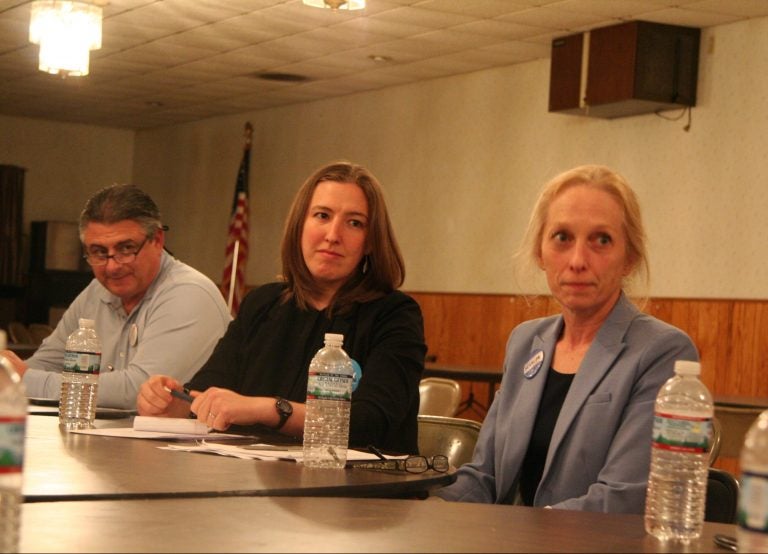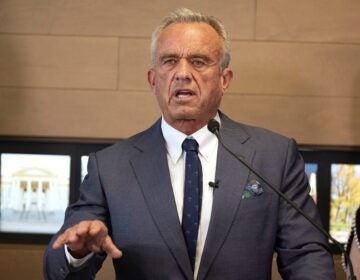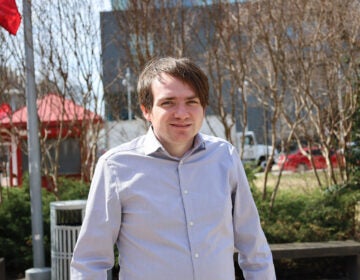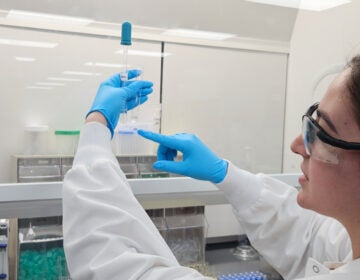Scientists experiment with congressional candidacy in Pennsylvania, around U.S.
More than 50 scientists are running for federal office this year. Right now, the vast majority of people in Congress have backgrounds in law, business, or politics.
Listen 3:59
(From left) Dave Delloso, Molly Sheehan, and Mary Gay Scanlon, attend a candidates forum on the opioid crisis. (Alan Yu/WHYY)
It’s not totally new to see a scientist running for federal office, but this year, more than 50 are testing the theory that an empirical approach to democracy could benefit the country.
Like many others, Molly Sheehan hit a bit of a turning point in her life in 2016 with the election of President Donald Trump. At the time, she was a bioengineer at the University of Pennsylvania, developing new tools to treat cancer and study the brain.
But after Trump’s election, she wondered, “What does it mean to advance research when we’re really in such a moment of crisis as a country, where people’s vital needs are being threatened?”
“I think a lot of us were shook out of our … laboratories and bubbles,” she said.
Scientists work in diverse environments, Sheehan said, with colleagues who depend on work visas to stay in the U.S. and some students who may be worried about deportation. Trump’s proposal to cut the budget for the National Institutes of Health by more than 20 percent was another impetus.
“It would obliterate programs and decades of work. Once you disband a research team, you never get that back,” she said. “You could lose decades of work and billions of dollars of investment, … missed the discoveries that we would have had.
“The fragility of the scientific and medical ecosystem has really jolted a lot of us to say, ‘Well, maybe I shouldn’t be so comfortable in this lab anymore. Maybe I really do need to fight for my colleagues that are in fear of being deported and fight for people who won’t even have access to the medicine we even do develop.’ ”
There may not be a lot of scientists and engineers in Congress right now, she said, but there should be.
“Engineering lends itself really well because we don’t work on problems that affect us directly,” she said. “I do cancer research; I don’t have cancer. It’s about what’s best for the end user, it’s about what’s best for the patient, what’s best for the constituent and, ultimately, that’s not how politics has been working, but it’s how it should work.”
Sheehan is running in the Democratic primary for the newly drawn 5th Congressional District in Pennsylvania, which covers Delaware County and parts of South Philadelphia.
She is one of three scientists running for Congress in Pennsylvania — and more than 50 across the country.
One of them is Elaine DiMasi. She used to be a physicist and project manager at the Brookhaven National Laboratory in New York. After working there for 21 years, she’s now running for Congress in New York as a Democrat.
Her decision to run goes back to a speech she heard seven years ago by Vern Ehlers, a physicist and longtime Republican congressman from Michigan who died last year.
“A scientist is not a prosecuting attorney of one half of a problem, according to a certain interest or party or donor,” he said. “We just have to solve the whole problem and obtain as much information about it as possible.”
The scientists running for Congress this year are almost all Democrats.
“I don’t know that Congressman Ehlers would even be nominated now if he were to start out,” said Jack Lessenberry, the senior political analyst at Michigan Radio. “On some things, he was very conservative. He was very anti-abortion. He was very much a proponent of lowering taxes.”
But Ehlers valued science above party, Lessenberry said.
“Whenever it came to anything scientific with him, and you could prove to him that something was bad for the environment or just not true in general, he always displayed integrity on that, even if he got a lot of grief sometimes from the other members of his party,” he said.
Ehlers did not ignore climate change, and he voted in favor of stronger fuel emissions standards for cars because he knew what putting so many cars on the road does to the atmosphere
“Science was seen as sort of above politics,” Lessenberry said. “But … we live in a different world now.”
Science has become political, Lessenberry said. And science, especially when it comes to issues like climate change, has now become part of the Democratic, progressive platform.
WHYY is your source for fact-based, in-depth journalism and information. As a nonprofit organization, we rely on financial support from readers like you. Please give today.





